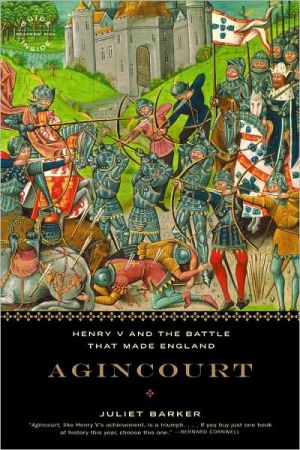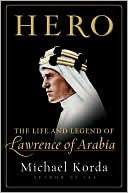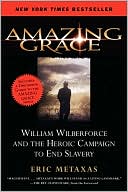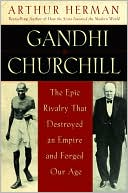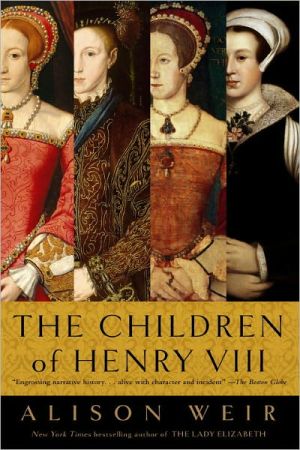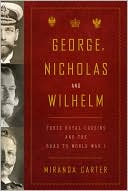Agincourt: Henry V and the Battle That Made England
Waged almost six centuries ago, the Battle of Agincourt still captivates. It is the classic underdog story, and generations have wondered how the English—outmanned by the French six to one—could have succeeded so bravely and brilliantly. Drawing on a wide range of sources, Juliet Barker paints a gripping narrative of the October 1415 clash between the outnumbered English archers and the heavily armored French knights. Populated with chivalrous heroes, dastardly spies, and a ferocious and bold...
Search in google:
Waged almost six centuries ago, the Battle of Agincourt still captivates. It is the classic underdog story, and generations have wondered how the English—outmanned by the French six to one—could have succeeded so bravely and brilliantly. Drawing on a wide range of sources, Juliet Barker paints a gripping narrative of the October 1415 clash between the outnumbered English archers and the heavily armored French knights. Populated with chivalrous heroes, dastardly spies, and a ferocious and bold king, AGINCOURT is as earthshaking as its subject—and confirms Juliet Barker's status as both a historian and a storyteller of the first rank. Publishers Weekly Barker, a British biographer (The Brontas) and accomplished medievalist, brings an excellent synergy of academic and literary skills to this study of the 1415 British campaign in France and the battle that was its climax, around which she elaborately reconstructs the conflict's antecedents. Henry V spent years preparing the ground: asserting initially shaky authority in England, exploiting domestic strife in France and isolating the disorganized kingdom from its traditional allies. During the campaign itself, a train of artillery manned by foreign gunners supplemented the men-at-arms and the longbowmen, who were the British army's real backbone. But the French were not the vainglorious incompetents of English legend and Shakespearean drama. Many in northern France made a brave effort, often putting aside personal and political differences to stand together at Agincourt, where they came closer to success than is generally realized. Barker shows that the battle hung by a thread: French numbers against English desperation, with courage a common virtue. She also illustrates how Agincourt was decisive-not only for its consequences in France. An English defeat would have meant chaos, perhaps civil war. Destiny on both sides of the Channel turned on the outcome of St. Crispin's Day. (June 14) Copyright 2006 Reed Business Information.
\ Publishers WeeklyBarker, a British biographer (The Brontas) and accomplished medievalist, brings an excellent synergy of academic and literary skills to this study of the 1415 British campaign in France and the battle that was its climax, around which she elaborately reconstructs the conflict's antecedents. Henry V spent years preparing the ground: asserting initially shaky authority in England, exploiting domestic strife in France and isolating the disorganized kingdom from its traditional allies. During the campaign itself, a train of artillery manned by foreign gunners supplemented the men-at-arms and the longbowmen, who were the British army's real backbone. But the French were not the vainglorious incompetents of English legend and Shakespearean drama. Many in northern France made a brave effort, often putting aside personal and political differences to stand together at Agincourt, where they came closer to success than is generally realized. Barker shows that the battle hung by a thread: French numbers against English desperation, with courage a common virtue. She also illustrates how Agincourt was decisive-not only for its consequences in France. An English defeat would have meant chaos, perhaps civil war. Destiny on both sides of the Channel turned on the outcome of St. Crispin's Day. (June 14) Copyright 2006 Reed Business Information.\ \ \ \ \ Library JournalOctober 25, 1415, St. Crispin's Day. Several thousand exhausted and diseased English soldiers, along with many nobles and King Henry V himself, were desperately trying to get to the safety of Calais when they came up against a far greater number of French forces, who were well rested and well fed. Miraculously, the English not only won the ensuing battle of Agincourt but destroyed most of France's nobility, almost all of whom were in the French forces. Barker (Wordsworth: A Life), a medievalist by training, here tackles one of the most significant battles of the Middle Ages. Beginning with Henry's training in the Welsh wars, Barker weaves a gripping narrative of the events that led to his invasion of France in August 1415, the long siege of Harfleur that followed, and the Battle of Agincourt and its aftermath. Along the way, she discusses controversies about the sizes of the respective armies and the effectiveness of the new longbow. Discarding the myths that have surrounded the battle, she gives a true feeling of the stress and exhaustion of this harrowing campaign, immortalized by Shakespeare. The truth of Agincourt is still being sought by scholars and is every bit as engrossing as the myth. Ann Curry's recent Agincourt: A New History concludes that the opposing forces were more evenly matched in numbers. Both Barker and Curry have written worthy volumes for any library. If a public library must choose only one, Barker's is the more accessible to general readers.-Robert Harbison, Western Kentucky Univ. Lib., Bowling Green Copyright 2006 Reed Business Information.\ \ \ Kirkus ReviewsHenry V leads the English to a stunning victory over a vastly superior French force at Agincourt in 1415. A favorite of military historians and well-known to acolytes of Shakespeare, the battle of Agincourt is remembered largely because of the odds overcome by an outmanned force of Englishmen. Historian Barker (Wordsworth: A Life, 2005) focuses on events leading up to the battle and how that battle defined Henry's rule and legacy. Following the death of his father, Henry moved swiftly to secure his throne and proceeded to launch a campaign to retake what he viewed as his rightful inheritance in France. An unstable French monarch and rival factions of French noblemen wary of joining forces only strengthened Henry's confidence. After capturing the city of Harfleur, Henry decided to move his troops, significantly weakened by dysentery, to the English stronghold of Calais. The French army, however, had other plans. While other sources, namely Curry's Agincourt: A New History (2005), argue for a smaller discrepancy, Barker gives the French a 6:1 advantage. The French, though, were led by vainglorious men with conflicting agendas. A soggy battlefield and questionable tactics essentially neutralized the French cavalry, allowing the cornered English to use their vaunted Welsh longbows to annihilate their enemy. Barker estimates French losses in the thousands while the English lost less than a quarter of their considerably smaller force. Though an impressive victory, its long-term ramifications were few, and Barker argues that perhaps its most significant effect was persuading the populace of Henry's divine right to rule. The author's only weakness is a tendency to justify Henry's few missteps andthe failures of the French commanders in order to make the battle seem more epic and less luck or poor execution. Like a Welsh archer: hits the mark more often than not.\ \
